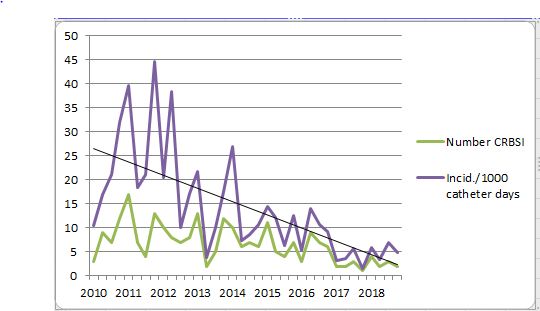Introduction: Children hospitalized in gastroenterology units for parenteral nutrition are exposed to central venous catheters (CVC) and the occurrence of infection on CVC. These infections are a major cause of morbidity and mortality for these patients. Prevention methods aiming education of the nursing team and optimization of intravascular medical devices are implemented. The aim of this study is to assess incidence trend and to observe influence of these methods to improve health care quality.
Methods: A prospective surveillance study was performed in the pediatric gastroenterology and artificial nutrition unit of Lyon university hospital. Since 2010, any child hospitalized in the ward with a CVC for parenteral nutrition was included. The data were collected by research of bacteriological results in blood culture and discussed with the clinicians. The number of catheter days was counted by the clinicians by number of parenteral nutrition bags administered in the clinical ward. The incidence of blood-stream infections was expressed by 1000 catheter-days.
Results: The surveillance conducted since 2010 shows a constant decrease of catheter-related blood-stream infections (CRBSI) since 2012. The annual infection rate was initially superior to 20/1000 catheter days. This high incidence was following the move of the clinical unit to a new pediatric university hospital and the high turn-over of the nursing team. From 2012 to 2016, the incidence decreased constantly between 20 and 10 CRBSI/1000 catheter days. Since 2017, the incidence is inferior to 5 infections for 1000 catheter days.
Several measures of quality care improvement were implemented successively: the revision of protocols, numerous training workshops of care practices, and audits were performed. The newly recruited and interim nurses without training were not allowed to manipulate the central catheters. The catheter material was optimized by the implementation of new perfusion lines adapted to the pediatric context.
Conclusions: The surveillance of bacteremia highlights an important decrease of CRBSI in children hospitalized in gastroenterology for parenteral nutrition. The improvement of quality of care seems to be linked to this decrease: reorganization of nursing care, training workshops for perfusion line connection and manipulation, improvement of care protocols and perfusion material optimization.

.jpg )